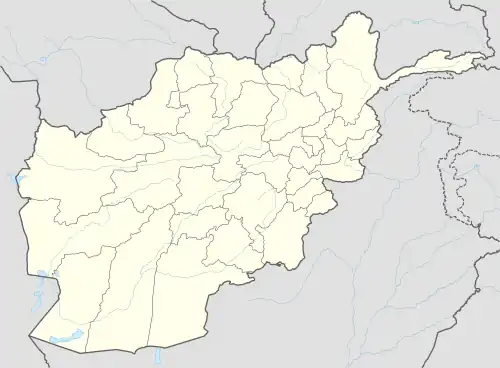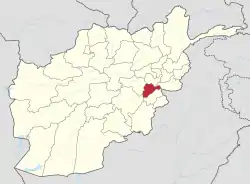Kulangar
Kulangār/ Kolangar (Dari: کلنگار, Pashto: کلنګار) is a village in Pul-i Alam District, Logar province, Afghanistan.[1]
Kulangar/ Kolangar
کلنگار, کلنګار | |
|---|---|
village | |
 Kulangar/ Kolangar | |
| Coordinates: 34°02′17″N 069°01′20″E | |
| Country | |
| Province | Logar Province |
| Rural District | Puli Alam District |
| Time zone | UTC+4:30 (IRST) |
| • Summer (DST) | UTC+5:30 (IRDT) |
Name
The folk etymology behind the name Kulangār is for it to having to do with a story about a crane (Persian: kulang, کلنگ).[2] The more likely origin of the name however are the Dardic words kul meaning "tribe" and aṅgār meaning "fire", making up the meaning "fire tribe". This origin may be a relic of the Dardic languages native to the region in pre-Islamic times.
The Shrine of Malik Sabz Ali
In Kulangar lies the shrine of Malik Sabz Ali ibn Malik Yusuf (died 1541 CE).[3] The site is a popular place of pilgrimage, attracting visitors from around the province.
References
- Kulangar can be found at GEOnet Names Server, at this link, by opening the Advanced Search box, entering "-3381672" in the "Unique Feature Id" form, and clicking on "Search Database".
- Joseph, Steingass, Francis (1892). "A Comprehensive Persian-English Dictionary, Including the Arabic Words and Phrases to be Met with in Persian Literature". dsalsrv02.uchicago.edu. Retrieved 2018-05-03.
{{cite web}}: CS1 maint: multiple names: authors list (link) - "The Kabul Times - Logar ancient, historical sites need urgent attention". thekabultimes.gov.af. Retrieved 2018-05-03.
This article is issued from Wikipedia. The text is licensed under Creative Commons - Attribution - Sharealike. Additional terms may apply for the media files.
